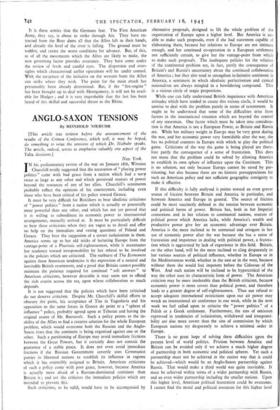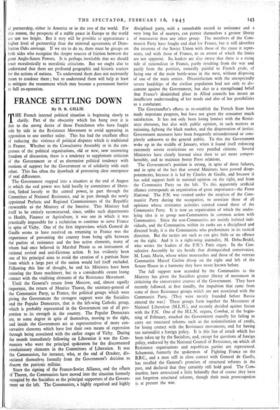ANGLO-SAXON TENSIONS
By REINHOLD NIEBUHR [This article was written before the announcement of the results of the Crimea Conference, which will, it may be hoped, do something to relax the tensions of which Dr. Niebuhr speaks. The article, indeed, serves to emphasise valuably one aspect of the Yalta decisions.]
New York. IN his parliamentary review of the war on January nth, Winston
Churchill testily suggested that the accusation of " playing power politics" came with bad grace from a nation which had a navy twice as large as any other and which possessed sources of power beyond the resources of any of her allies. Churchill's sentiments probably reflect the opinions of his countrymen, including even those who have been critical of his policy toward Greece.
It must be very difficult for Britishers to bear idealistic criticisms of " power politics " from a nation which is actually or potentially more powerful than any other, and which has not yet proved that it is willing to subordinate its economic power to international arrangements, mutually arrived at. It must be particularly difficult to bear these criticisms when they are vague as to detail and offer no help on the immediate and vexing questions of Poland and Greece. They bear the suggestion of a covert isolationism in them. America seems up to her old tricks of lecturing Europe from the vantage-point of a Pharisaic self-righteousness, while it accentuates her tendency toward irresponsibility by her refusal to be involved in the policies which are criticised. The outburst of The Economist against these American tendencies is the expression of a natural and inevitable British resentment, and a proof that Britain cannot possibly maintain the patience required for continual " soft answers" to American criticisms, however desirable it may seem not to offend the rich cousin across the sea, upon whose collaboration so much depends.
It is not suggested that the policies which have been criticised do not deserve criticism. Despite Mr. Churchill's skilful efforts to obscure the point, his acceptance of Tito in Yugoslavia and his opposition to the same forces in Greece do point to a " sphere of influence " policy, probably agreed upon at Teheran and having the original assent of Mr. Roosevelt. Such a policy points to the in- ability of the Allies to find a creative solution for the whole European problem, which would overcome both the Russian and the Anglo- Saxon fears that the continent is being organised against-one or the other. Such a partitioning of Europe may avoid immediate frictions between the Great Powers, but it certainly does not contain the guarantee of a stable peace. It does not even avoid immediate frictions if the Russian Government covertly uses Communist parties in liberated nations to establish its influence ih regions which it has ostensibly assigned to Britain. American criticisms of such a policy come with poor grace, however, because America is actually more afraid of a Russian-dominated continent than Britain is ; and yet she criticises the immediate policies which are intended to prevent this.
Such criticisms, to be valid, would have to be accompanied by
alternative proposals, designed to lift the whole problem of the organisation of Europe upon a higher level. But America is un- able to make such proposals, even if she had statesmen capable of elaborating them, because her relations to Europe are not intimate enough, and her continued co-operation in a European settlement not sufficiently certain, to give her the vantage-point from which to make such proposals. The inadequate policies for the solution of the continental problem are, in fact, partly the consequence of Britain's and Russia's uncertainty about the continued collaboration of America ; but they also tend to strengthen isolationist sentiment in America, a sentiment in which idealistic perfectionism and cynical nationalism are always mingled in a bewildering compound. This is a vicious circle of tragic proportions.
While one can fully understand British impatience with American attitudes which have tended to create this vicious circle, it would be unwise to deal with the problem purely in terms of resentment. It ought to be understood that some of the difficulties arise from factors in the international situation which are beyond the control of any statesman. One factor which must be taken into considera- tion is that America is not a European Power, as Britain and Russia are. While her military weight in Europe may be very great during the war, and her economic power very formidable after the war, she has no political counters in Europe with which to play the political game. Criticisms of the way the game is being played are there- fore partly the consequence of a sense of frustration. This does not mean that the problem could be solved by allowing America to establish its own sphere of influence upon the Continent. This is no solution, not only because Europe cannot be saved by par- titioning, but also because there are no historic presuppositions for such an American policy and not sufficient geographic contiguity to make it effective.
If this difficulty is fully analysed it points toward an even graver source of friction between Britain and America in particular, and between America and Europe in general. The source of friction could be most succinctly defined as the tension between economic and political forms of power. Britain has, both in her Imperial connexions and in her relation to continental nations, sources of political power which America lacks, while America's wealth and productive power give her an economic advantage over Britain. America is the, more inclined to be unmutual and arrogant in her use of economic power after the war because she has a sense of frustration and impotence in dealing with political power, a frustra- tion which is aggravated by lack of experience in this field. Britain, on the other hand, will be the more inclined to cling desperately to her various sources of political influence, whether in Europe or in the Mediterranean world, whether in the east or in the west, because without them she would feel impotent before the Colossus' of the West. And each nation will be inclined to be hypercritical.'of the way the other uses its characteristic form of power. The American criticism may be more intolerable than the British criticism, because economic power is more covert than political power, and therefore leads to a greater degree of self-righteousness. Thus our refusal to accept adequate international restrictions upon our air power may wreck an international air conference in one week, while in the next week we feel called upon to criticise the " power politics?' of a Polish or a Greek settlement. Furthermore, the sins of omission expressed in tendencies of isolationism, withdrawal and irresponsi- bility are also more covert than the sins of commission by which European nations try desperately to achieve a minimal order in Europe.
There is no great hope of solving these difficulties upon the present level of world politics. Friction between America and Britain can be avoided only if we achieve a much higher degree of partnership in both economic and political spheres. Yet such a partnership must not be achieved in the easiest way that it could be achieved—which would be an Anglo-Saxon partnership against Russia. That would make a third world war quite inevitable. It must be achieved within terms of a wider partnership with Russia, and an even wider partnership including the smaller nations. Upon this higher level, American political frustration could be overcome. I cannot find the moral and political resources for this higher level of partnership, either in America or in the rest of the world. For this reason, the prospects of a stable peace in Europe or the world are not too bright. But it may still be possible to approximate a higher level of partnership than the minimal agreements of Dum- barton Oaks envisage. If we are to do so, there must be groups on both sides who recognise the deeper sources of friction between the great Anglo-Saxon Powers. It is perhaps inevitable that we should react moralistically to moralistic criticisms. But we ought also to understand that there are profound geographic and historic sources for the actions of nations. To understand them does not necessarily mean to condone them ; but to understand them will help at least to mitigate the resentment which may become a permanent barrier to full co-operation.



























 Previous page
Previous page